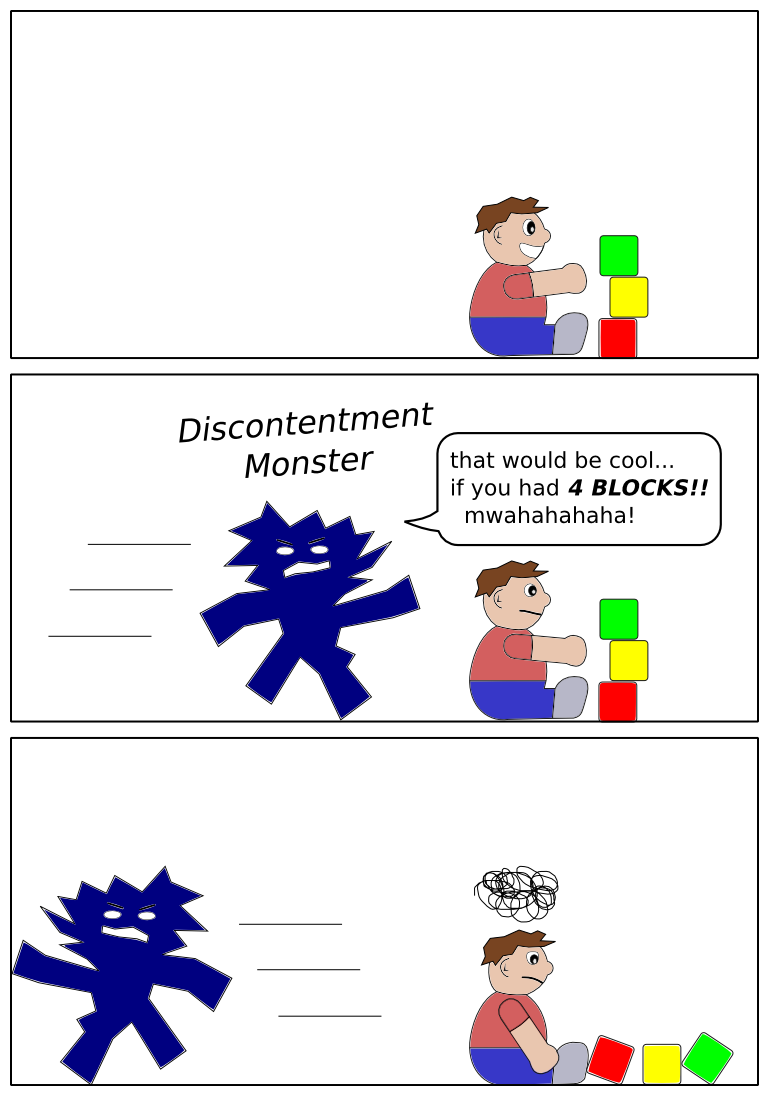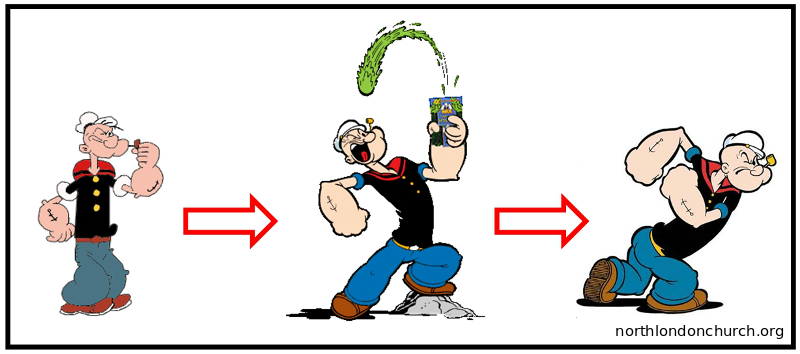Contentment for Over-Driven Perfectionists
Contentment is a huge element of the success of a cross-cultural gospel worker. A content and thankful heart is a lot like what spinach was for Popeye. It propels him forward with all kinds of life and strength.
Conversely, discontentment is a huge pitfall, one of the biggest disablers in the life of faith. If contentment is Popeye’s spinach, discontentment is a soccer player’s broken ankle. It just takes us right out, and ruins our life. We’re often told to guard against discontentment about our living situations, the public transit in the city we’re living, or the food we have to eat all the time, or our singleness, or the commitments of a family with kids.
But that nasty, disabling discontentment can come in some more surprising and devious forms.
It can be something as simple or unassuming as discontentment with our ministry performance, or our opportunities to meet people and share the good news, or our amount of hours available for language study. I’m not talking about the kind of forward-driving dissatisfaction with mediocrity that propels us forward to hard work and excellence. I’m talking about a stagnant, despairing negativity that does nothing but lead us into self-pity, stress, and gloom.
Guess what? You may not be as productive as you think you should be
A lot of really driven people who were smart and successful in their home countries can struggle with this. When driven, hard-working people step into a whole ‘nother world, filled with a new language, a culture they aren’t comfortable in, and all kinds of crazy spiritual opposition, suddenly they face the reality that they can’t do what they should, what they feel they MUST do! There are just all kinds of unforeseen hindrances that crop up in this kind of life. And these little (or big) obstacles that suppress their precious success and destroy their valuable work programme become looming monsters that are constantly ruining their life. These setbacks can work to become the focal point of so much deliberation, frustration, and anxiety.
This last year or so, for example, I have had some constant problems with my housing situation. I came pretty close to despair, (and very close to raging frustration) about how I had to keep on spending hours and hours and days and days trying to clean up some mold outbreak, or move from place to place, or freak out about what I could do with a bunch of expired paint that some painters incidentally ruined my bedroom with. Why did I have to lose such a huge chunk of my precious time in this country over this senseless difficulty?
Getting upset about these obstacles and hindrances can seem like the proper expression of every fiber of our driven, successful beings, but it’s not. There’s a restlessness that pushes us forward to change what we can and get over obstacles and succeed. And then there’s a discontent that does nothing but convince us of the impossibility of doing the amount that we want to. It tries to tell us that the 70% we can do it is really nothing because we’re not able to do the 85% that we think we should. It’s as illogical and ridiculous as someone saying “you can’t get there from here.” What?! Why not just turn around and start walking towards the road that does get there? Why not just do the 70% and rejoice? Because walking towards that round-about road is better than throwing your hands up and saying “ah, well I can’t get there from here.” And doing the 70% with a spirit of thanksgiving and his joy propelling us forward is better than diving into gloom and doing 0%.
“Be joyful always, pray continually. Give thanks in all circumstance, for this is God’s will for you in Christ Jesus.” 1 Thess. 5:16-18
It may seem that your practical commitments, or things your leadership makes you do, or that nasty situation you’re in might take 40% of your time and efforts. You might feel like all of your efforts are actually only 60% of what could be done, because of those annoying obstacles in the way.
But if you give up contentment and fall into bitterness and discouragement, you’ll loose 100% of it.
Embrace the 60% or the 80% or the 20% that you can do. After all, we’re dead anyways. Anything we do in this impossible, backwards life is a miracle. So relax. Enjoy him and the little things he’s putting before you. When your faithful, thankful, joyful, and content with little… he will give you a lot. And everything comes from him.
For the purpose of this next example, let’s think of ourselves as children, which is what we really are. The cross-cultural language-learning process just makes this more painfully obvious. Discontent works a little bit like this:

But if the child could just relax, and not listen to the discontentment monster, there’s plenty of great thıngs that could be done with the 3 blocks their Father’s given him.
“For you are God’s workmanship, created in Christ Jesus to do good works, which he prepared in advance for you to do, that you may walk in them.” (Eph 2:10)
Just like Abraham did, trust this promise of God, even if it seems impossible and ridiculous, and even if it seems like the whole world is working against you. Abraham was weak and old, and physically incapable of producing anything but…
“No amount of unbelief caused him to doubt the promise of God. But he grew strong in faith as he gave glory to God.” (Romans 4:20)
Take God at his word, praise him, and you’ll grow strong in faith.
If your driven, harsh dissatisfaction with whatever you’re facing doesn’t help you to be overflowing with joy in your current situation, it’s not helping at all. Because every bit of usefulness that we could ever produce springs forward out of a joyful heart in him.
“May the God of hope fill you with all joy and peace as you trust in him. So that you may overflow with hope by the power of the Holy Spirit.” (Romans 15:13)
(Human) perfectionism doesn’t really help
Jesus tells us to “be perfect.” (Matt. 5:48) The word there means to be perfect, complete, finished, or fully developed. We’re to grow fully, completely, and perfectly in holiness and goodness, and so to act and think like our heavenly father. Leaning and trusting God for his perfect, no-compromises life of holiness and truth is good. But there’s another kind of perfectionism, a kind of human striving towards arbitrary ideals and a ruthless evaluation of everything we do. This is different, and it’s bad.
Andrew Murray, in the wonderful book Abide in Christ talked about something similar that he called “The impatience of the flesh, which forms its judgment of the life and progress of the soul not after the divine but the human standard.”
This kind of perfectionism is an ever-illusive, undefinable, insatiable monster, looking to suck your life and happiness away. Ok, maybe that sounds a bit harsh, but whatever it is, it’s often not life giving. It tends to just throws some arbitrary ideals at us that we often can’t measure up to. In other words: it doesn’t help, it just stands there and makes you feel terrible.
But Christ–not our cold ideals of what we think our life and work should look like–always beckons us on with understanding, care, love, and encouragement. Jesus knew how to work with and be happy with many non-ideal people and situations. He looked at his semi-effectual disciples, carrying on immaturely with their slightly misguided focus, and…
“full of joy through the Holy Spirit, said, ‘I praise you Father, Lord of heaven and earth because you have hidden these things fro the wise and learned, and revealed them to little children. Yes, father, for this was your good pleasure.’” (Matt. 11:25)
Seeing a bit of the Father’s joy and pleasure trumps all. Always.
The apostle Paul, one of the hugest forces in the spread of the Gospel, did not always have what appeared to be an ideal and productive life. Let’s have a look at some of his life and work conditions: Being in hunger, getting slandered and locked up in jail cells, being shipwrecked, being terribly sick, being tied up and flogged, living under house arrest. These are not exactly elements of a healthy, productive, optimized life. In fact, it’s pretty much impossible to do anything useful at all while you are in these situations. But that didn’t seem to bother him too much.
“I have learned to be content whatever the circumstances. I know what it is to be in need, and I know what it is to have plenty. I have learned the secret of being content in any and every situation, whether well fed or hungry, whether living in plenty or in want. I can do all this through him who gives me strength.” (Phil. 4:11-13)
In all these situations, Paul knew Christ and his joy and strength inside of him, and he got to see God working miraculously in all kinds of ridiculous situations. He was less concerned with himself, and more concerned with Christ. He realized that his own life wasn’t really that big of a deal, but that Jesus meant everything. And so he was content to have Christ. That was enough, and he could happily work at an endless stream of awesome opportunities that God was bringing in front of him. All he needed was a steady diet of spinach contentment.
